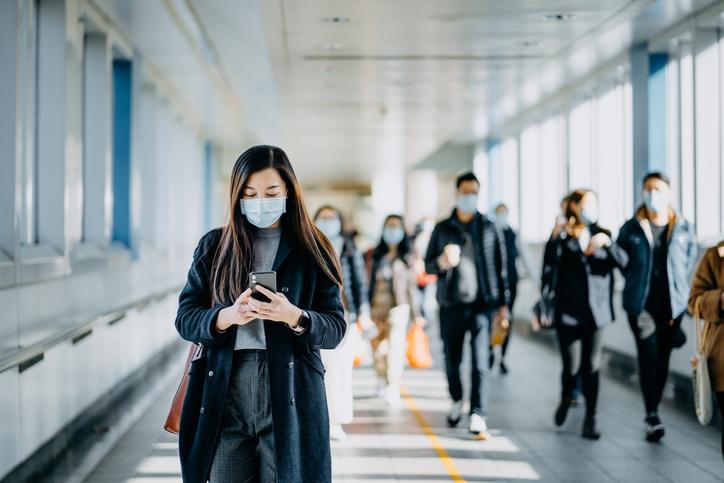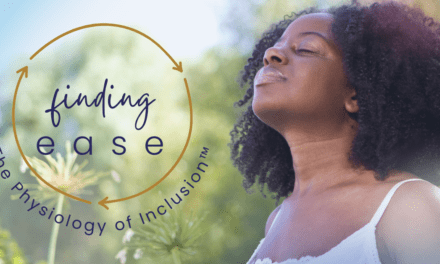
It’s an unprecedented time we are living in—pandemics themselves aren’t new, but the rise and power of social media and the increased global connectedness both socially and economically, during a pandemic, is. We know that too much media consumption can be toxic, but we are also balancing this with wanting to make sure we are understanding the facts, as the status of our local, national, and global environment changes.
I have witnessed the pandemic bring out some of the worst in people-—racism, xenophobia, entitlement, greed, and ultimately “othering”—excluding, shaming, and hurting those in highest need of care, people of color, and those who don’t have the resources to manage, let alone survive, a pandemic like this. To overcome the virus as a nation, as a world, it is imperative that we prioritize health equity and inclusion and utilize our global connectedness for the positive: taking inclusive stances that prioritize the health of all people through our actions, our companies, our communities.
To overcome the virus as a nation, as a world, it is imperative that we prioritize health equity and inclusion and utilize our global connectedness for the positive, Share on XAs a public health professional, my brain goes straight to this question: how can we make health equity and inclusion actionable? Health equity, as described by the American Public Health Association, means that everyone has the opportunity to attain the highest level of health, regardless of their social, environmental or demographic status.
So, how can we achieve health equity amidst this pandemic? My answer: We must think beyond ourselves.
So, how can we achieve health equity amidst this pandemic? My answer: We must think beyond ourselves. Share on XWhether you are someone who has the ability to practice distancing, or you or someone you know are working on the frontlines to take care of those most affected, here are some ways to spread love, care, and equity, not disease.
- Take a stance against the xenophobic and racist messaging surrounding COVID-19: Earlier this week, President Trump, coined COVID-19 as the “Chinese Virus.” A White House official used the term “Kung-Flu” to describe the virus to an Asian CBS Reporter. This may seem small and trivial, especially given that many people have spoken out against the many racist headlines, but the damage is rampant and is spreading—growing fears have drastically stifled Asian restaurants and other businesses: for example, business in Chinatown NYC has dropped 50-70% and is projected to continue to drop, even as China begins recovering. Have Italian restaurants and businesses suffered as much? Nope. Coincidence? Not at all.
The xenophobia and racism against Asian-Americans is rampant and must stop. Not only is this rhetoric flat out false, it is rude and misleading to people who are already skeptical of preventative measures in place such as social distancing and hygiene. If you are a leader at your organization, or if your family has shared a xenophobic article, there is no better time to dispel these misconceptions than now. Send an email to your colleagues to show solidarity with the communities affected. Be intentional about supporting Asian-owned businesses as much as you can at this time. This virus is not a fault of any group or community.
If you are a leader at your organization, or if your family has shared a xenophobic article, there is no better time to dispel these misconceptions than now. Share on X
- Recognize that prevention can and does look different for everyone: It is important to recognize that not all preventative recommendations are possible for everyone. Having the choice to stay at home and safe, is a privilege—health care and childcare workers are some of the exceptions to many of the current rules. Additionally, home isn’t a safe haven for all. Many people live in unsafe home environments that may involve trauma, abuse, and violence. What all of us can do is do the best that we can. Check in on friends and family. Perhaps offer an extra room in your home as a safe space for a friend struggling. Those at high risk, such as people who are immunocompromised, may be taking extra cautionary measures. Check in virtually and maintain social support, as this can be much scarier and isolating for those most vulnerable. It may look like many celebrities are being tested quickly due to increased access to testing, but this is not the reality for most. For perspective, in one day the Utah Jazz basketball team conducted 58 tests, whereas an entire state might not have more than 50 tests.
- Be cognizant of your consumption: About 23.5 million people in this country live in a “food desert,” which means there is no grocery store within a ten-mile radius of their homes. More than half of these people are low-income, and already struggle to afford food in the first place. Before you load your cart with more pasta sauce than you can consume, think about how much you actually need for you and your family, instead of letting the empty aisles feed into your conscience. If you run out of food, do you have the ability to make a run to the store, or perhaps get food delivered? For many people, this isn’t an option in their daily lives, regardless of the pandemic. A friend of mine shared one high impact thing you can do: avoid items with a “WIC” label at the grocery store. While they may be less expensive, these items are designated for purchase for those with government benefits through the Special Supplemental Nutrition Assistance Program for Women, Infants, and Children (WIC). This program allows low income mothers to be able to provide healthy food for their families, but only labeled foods are eligible. Without these options, they are not able to purchase their food.
- Support social change through social media: I mentioned a lot of the negativity that the media is perpetuating surrounding the pandemic, but there is also a lot of “good” and ways to help achieve health equity and support overcoming this disease from behind your screen. This is a great time to not only speak up, but also mobilize and take action virtually. The C19 Help Squad is a new resource for people to share their skills, talents, or resources as well as seek affordable resources for things they might not have access to during this time. This is also a great way to support those who may be temporarily unemployed as well. Additionally, here is a list of organizations providing food and medical aid to underserved communities that you can support through monetary donations or volunteering with packaging and delivery.
The last thing we need during these stressful and uncertain times is to perpetuate the systemic biases and prejudices that have already infiltrated our country and our world for years, centuries even. I implore us all to reflect upon some of the suggestions above and recognize the privileges and power we have in order to make strides toward health equity during these uncertain times. COVID-19 involves all of us—it doesn’t discriminate, and neither should we.
COVID-19 involves all of us- it doesn’t discriminate, and neither should we. Share on X

















